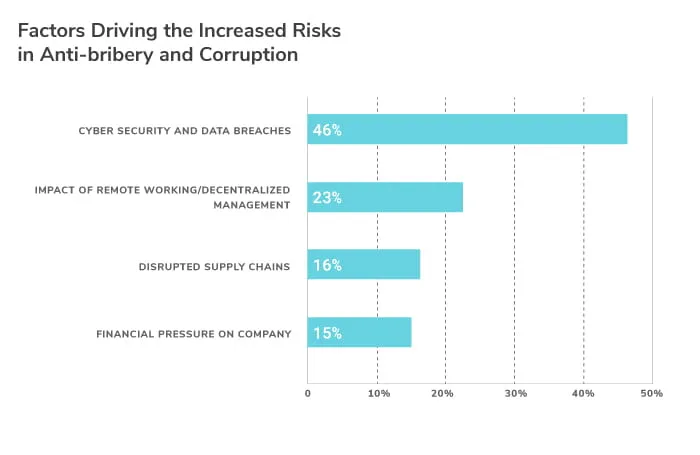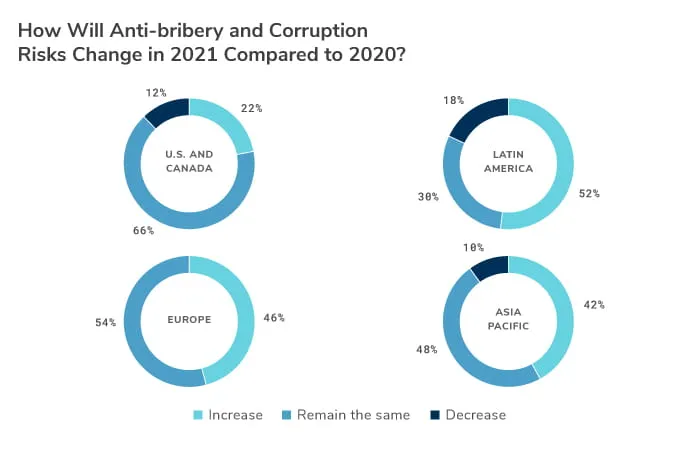Few factors influence an organization’s perception of their anti-bribery and corruption (ABC) risks as much as the risk of regulatory enforcement action. 90% of survey respondents believe their ABC risks would increase or stay the same in 2021 compared to 2020, and with the pandemic and political shifts, it is likely that compliance professionals will keep a close eye on how regulations may change.

In the U.S., compliance professionals are closely following actions from the Biden Administration as it navigates towards its first six months in office to understand what expectations may look like over the next four years. Leading up to the presidential election and now into his administration, President Biden has been vocal regarding his commitment to fighting corruption on a global scale. As a primary objective of the Biden Administration, compliance professionals must continue to be prepared to address the added expectations and scrutiny they will likely be under as a result of this commitment and the administration’s view that corruption is a core national security matter for the U.S. As such, this approach will necessitate increased time commitments to key areas of concern related to corruption and its prevention, as well as ensuring that appropriate resources are in place to meet the ever-changing and developing regulatory landscape governing U.S.-based financial institutions and corporate entities operation on a global scale. This “whole of government approach” and the potential for regulatory enforcement action around the globe, will continue to necessitate that dedicated compliance professionals identify, remediate and monitor corruptions risks they face to ensure they are meeting their organizations’ supervisory expectations as they operate around the world.
For those who have followed corruption as a campaign issue through multiple U.S. presidential administrations, it is expected that we hear from a newly elected President on the degree of commitment to this subject. Yet compliance professionals, no matter who may occupy the White House, consistently seek to ensure and achieve transparency, accountability and integrity across the globe on a day-to-day basis in regard to how their enterprises operate. Risks associated with corruption are top of mind for compliance professionals on a daily basis and require continuous review to ensure effectiveness as it relates to risks posed by third parties and the evolving expectations associated with environmental, social and governance (ESG) commitments, cybersecurity, supply chain resilience and financial pressures. Corruption does not discriminate from an industry perspective. Given the fact that we are gradually emerging from a global pandemic, it is imperative that compliance commitments to the execution and robustness of program policies, procedures, systems and controls be constantly monitored, allow for remediation of critical issues identified and, in certain instances, self-reporting to regulators to potentially achieve a reduction in sentencing if penalized.

Outside of the U.S., more survey respondents believe their ABC risks will increase in 2021 compared to 2020. International enforcement will continue to be shaped by the ongoing pandemic, as regulators have expressed eagerness on prosecuting pandemic-related fraud. In many regions, enforcement agencies were significantly impacted by the pandemic with resource and movement restrictions impeding investigations and prosecutions. It is likely that enforcement activity will return to a similar or more ambitious pace than before. Particularly in Europe, we can also expect continued regulatory attention on how businesses took advantage of government aid, and how that aid was obtained and deployed. Companies can conduct look backs of their organization’s activities during the pandemic to ensure they were not unknowingly exposed to additional corruption risks. In the UK, enforcement agencies will likely experience additional budgetary challenges following Brexit and leading to a greater emphasis on self-reporting in 2021. With the EU implementing the Whistleblower Directive in 2021, companies with footprints in the UK and the EU have additional incentive to review their whistleblower policies and position on self-reporting.
In Latin America, a diverse region with many countries where anti-corruption is a top political issue, 52% of survey respondents believe their ABC risks will increase in 2021. The region saw significant regulatory developments in the wake of the 2014 Car Wash investigation, and many of these regulatory developments were heavily impacted in 2020 by the pandemic, intense economic and currency pressures, and political change. With the end of the Car Wash investigation in Brazil in 2020, President Jair Bolsonaro declared his government to be corruption free. However, regulators have directed particular attention to how emergency contracts were awarded and have already begun uncovering significant fraud. In Mexico, a country still working to implement anti-corruption–related judicial reform and legislation, 2020 was a hallmark year for investigations into public officials and their decisions during previous executive administrations. The administration of President Andrés Manuel López Obrador announced an investigation in late 2020 into key members of the opposition party that is expected by many to be far-reaching and dominate national headlines throughout 2021. Companies would be prudent to re-review their activities not only during the pandemic, but also any relationships they or their affiliates may have had with public officials.
In Asia-Pacific, a vast and diverse geography that is largely still waiting for widespread anti-corruption enforcement efforts, 42% of survey respondents believe their ABC risks will increase in 2021 and 48% would stay the same. The region is seeing early indicators of a return to normal in certain countries, although many expect that the various pandemic-related challenges, such as those caused by disrupted supply chains and new market trends, will continue in 2021. In China for example, the continued spread of e-commerce platforms and the additional risks of commercial bribery has led Chinese regulators to pursue additional efforts to improve their whistleblower regime and combat non-compliance. U.S. law enforcement priorities related to anti-corruption investigations are also expected to maintain the same course that it set in Asia (and particularly in China) prior to the new U.S. administration.
The Way Forward
Companies that operate in many different countries and under varied regulatory regimes always have a certain level of uncertainty within their compliance function when political winds change. Regardless of how governments may further shift their enforcement focus, the slow move to a post-pandemic world necessitates a re-commitment to anti-corruption programs that not only comply with regulatory expectations but also protect the organization against other unknowns into the future. ABC compliance programs were exposed to numerous unexpected challenges in 2020, and have developed a resiliency to prepare for other challenges in recognition of their ever-evolving corruption risks. No matter if we are in a pandemic or a post-pandemic era, what is consistent is that regulators will enforce legal obligations and bring action against those not adhering to compliance requirements.

